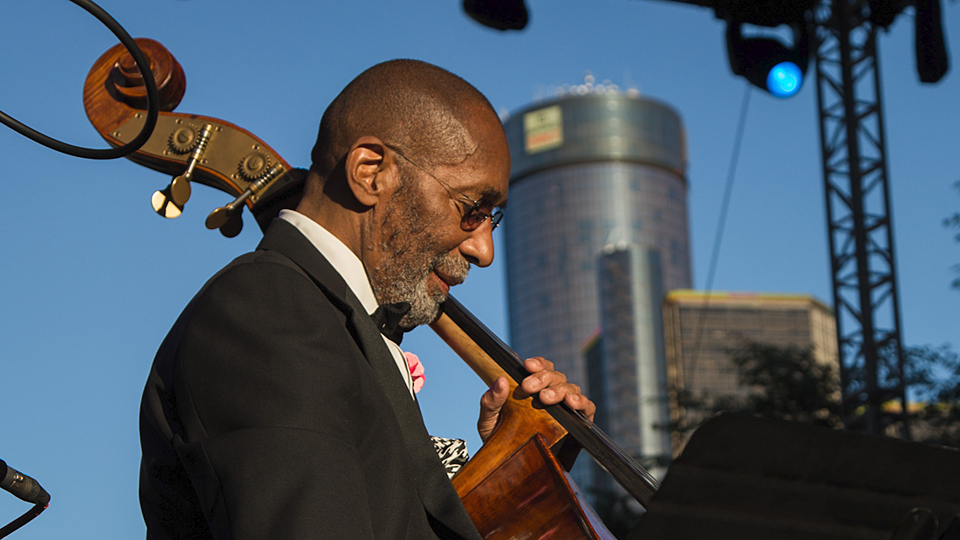The Best of the Best: Jazz from Detroit
Regie: Daniel Loewenthal
Vorstellungen im Kino
434 - So, 17:15, im Kino 3 ausverkauft

Zum Trailer
Inhalt
Aus der „Motor City” Detroit kommen nicht nur Autos, sondern auch eine große Zahl der weltweit einflussreichsten Jazzmusiker, wie z.B. Gerit Allen, Ron Carter und Elvin Jones.
“There is a Detroit sound or a Detroit feeling … It’s the sound of factories, it‘s the sound of the ghetto, the sound of our church.” (George Bohanon im Film)
Der Dokumentarfilm erklärt anhand von Interviews, alten Fotos und Filmaufnahmen, wie es in Detroit nach der Industrialisierung zum Entstehen einer der wichtigsten Jazzszenen in den USA gekommen ist. Zu Wort kommen Pat Metheny, Terence Blanchard, Christian McBride, Endea Owens, Karriem Riggins, Barry Harris. Und ganz wichtig, dabei swingt und groovt es über 89 Minuten ganz ungebremst.
Storyline
Not only cars come from the ‘Motor City’ of Detroit, but also a large number of the world's most influential jazz musicians.
Über den Film
IIt’s actually been amazing to watch the sort of transformation of some of this material into a new form and to learn, because I don’t know anything about, didn’t know anything about filmmaking. Now I do. Seeing how that material can transform and really deepen and become a much richer experience in many ways for an audience. So for instance, in the book, it’s organized by biographical chapters that these defining jazz musicians from Detroit. You can’t tell everybody’s story in a documentary film. And so what has happened in the film is that Detroit itself has become a much richer and deeper character. And we have embedded the history of jazz from Detroit and the stories of these great musicians within the rise and fall, and hopefully rise again, of Detroit‘s economic, social, cultural trajectory as an industrial power and the trials and triumphs of the African American community in Detroit. [...] And the answer to the question of when you go deeper and you say, „Well, why Detroit?“ You know, that‘s a story that starts with the Great Migration. It brings hundreds of thousands of African Americans to the north to Detroit in the first half of the 20th century. And it‘s the story of jazz, an expression of African American culture. It‘s a music of improvisation, of adapting one‘s life to ever-shifting conditions, that is the African American experience. The Great Migration brings all of these folks to the north, they‘re attracted by the auto industry, which is offering some of the best wages in the country for African Americans. It builds a Black working middle class. In Detroit, that economic vitality creates the neighborhood of Paradise Valley, which is the economic and business center of Black Detroit in the middle of the 20th century. All those clubs, hotels, bars, opportunities for musicians ... and lay on top of that things like the Detroit public schools. Some of the best music programs in the country, particularly at places like Cass Tech. Cass was integrated. Black kids got the same opportunities there. It‘s no surprise that Donald Byrd and Paul Chambers and Ron Carter, and many, many others, all came out of Cass Tech in the 1950s. And much later, Geri Allen comes out of Cass Tech. So you lay all that together and then you lay on top of that mentorship, which is a huge theme in our film. [...] So you go, why Detroit? Well, that‘s why. And you can feel it still.
Interview mit Buch- und Drehbuchautor Mark Stryker auf www.pbs.com
| Regie | Daniel Loewenthal |
| Drehbuch | Mark Stryker |
| Kamera | Shane McMurphy |
| Darsteller | Pat Metheny, Terrance Blanchard, Christian McBride, Endea Owens, Karriem Riggins, Barry Harris |
